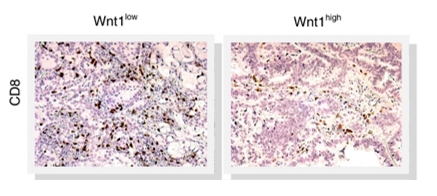10/04/2019
Lung adenocarcinoma (LUAD)-derived Wnts increase cancer cell proliferative/stemness potential, but whether they impact the immune microenvironment is unknown. Kerdidani et al. from Tsoumakidou lab demonstrated that LUAD cells use paracrine Wnt1 signaling to induce immune resistance. In TCGA, Wnt1 correlated strongly with tolerogenic genes. In another LUAD cohort, Wnt1 inversely associated with T cell abundance. Altering Wnt1 expression profoundly affected growth of murine lung adenocarcinomas and this was dependent on conventional dendritic cells (cDCs) and T cells. Mechanistically, Wnt1 lead to transcriptional silencing of CC/CXC chemokines in cDCs, T cell exclusion and cross-tolerance. Wnt-target genes were up-regulated in human intratumoral cDCs and decreased upon silencing Wnt1, accompanied by enhanced T cell cytotoxicity. siWnt1-nanoparticles given as single therapy or part of combinatorial immunotherapies acted at both arms of the cancer-immune ecosystem to halt tumor growth. Collectively, Kerdidani et al. showed that Wnt1 induces immunologically cold tumors through cDCs and highlighted its immunotherapeutic targeting. [Pubmed]
